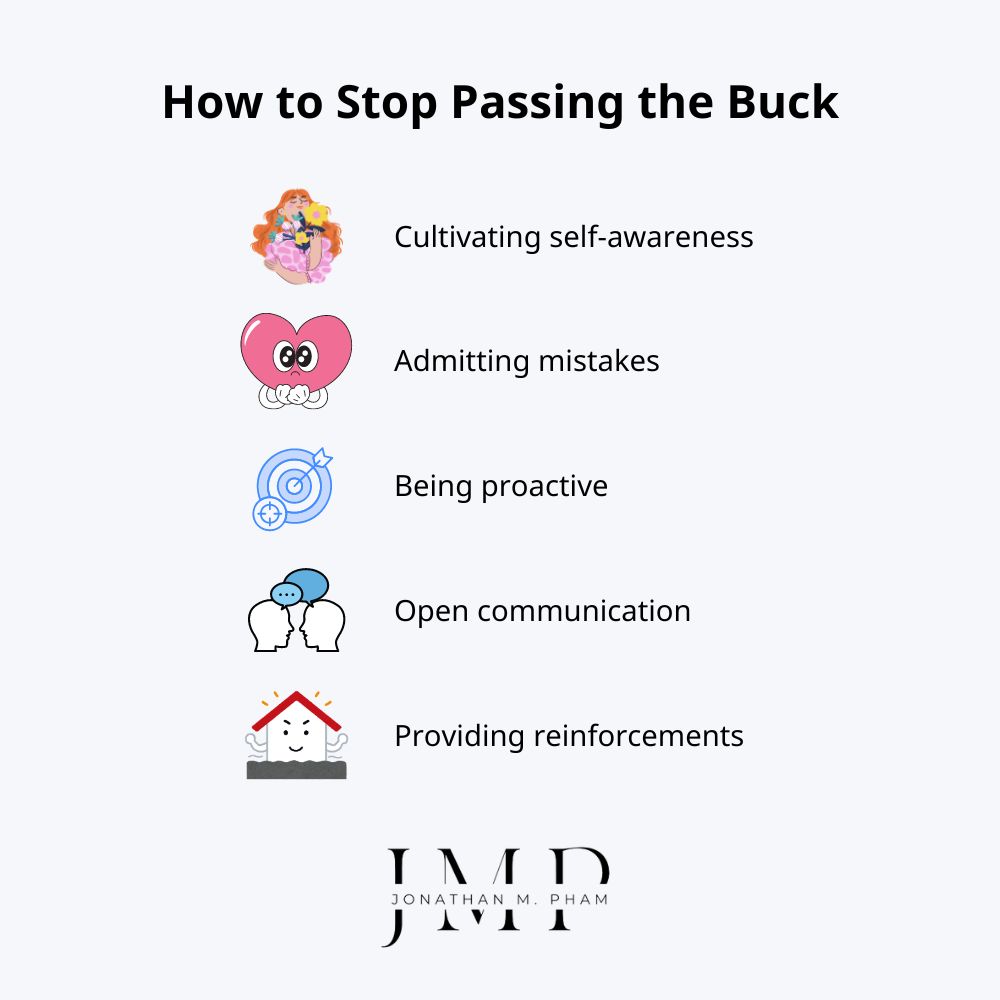Learn the psychology behind the bad habit of blaming others, plus how to break free from it and take responsibility for one’s actions.
Passing the buck – the act of shirking responsibility and shifting blame onto others – is an all-too-common habit that hinders personal growth, damages relationships, and obstructs progress. We have all witnessed or, at times, even participated in this blame game, pointing fingers at others instead of owning up to our actions. But what drives such destructive behavior? Why do we find it so challenging to take responsibility for our mistakes and shortcomings?
Highlights
- Passing the buck is the act of avoiding responsibility by shifting blame onto someone else. Typically driven by fear of consequences, low accountability, and lack of trust, it is a serious offense that erodes trust, damages relationships, denies growth opportunities, and promotes a culture of avoidance.
- A bad habit that rarely goes unnoticed, buck-passing is often accompanied by a need to win, making excuses, refusing to apologize, and blaming others for one’s own mistakes.
- Cultivating self-awareness, taking ownership of mistakes, being proactive, encouraging open communication, and providing reinforcements are strategies to stop passing the buck.
What is Passing the Buck?
“Passing the buck” is a well-known idiom that refers to the act of shifting blame or responsibility to someone else for a problem or situation that should rightfully be addressed by oneself. It manifests in a variety of contexts, including personal relationships, workplaces, and many more.
The phrase itself is often said to have originated from the game of poker, where a physical marker was used to denote the player responsible for dealing with the cards. If a player chose to avoid dealing, they could “pass the buck” to the next person.
Over time, the expression has gradually evolved and gained popularity. It is frequently associated with political contexts, where politicians employ it as a tactic to navigate issues in international relations and beyond. Additionally, buck-passing is also a common behavior observed in daily life; examples include:
- Children put the blame on their siblings for the untidiness of their room, avoiding accountability for their actions.
- Students shift the responsibility for their academic performance onto their teachers, rather than reflecting on their own efforts.
- In a corporate setting, a CEO might attribute the company’s financial woes to the actions of their predecessor, effectively passing the blame for their own shortcomings.
- Similarly, politicians may resort to blaming the previous administration for economic challenges, instead of taking ownership and implementing effective solutions.
- etc.
Why Has Passing the Buck Become So Prevalent?
The widespread prevalence of passing the buck can be attributed to a combination of psychological, organizational, and cultural factors that influence human behavior:
- Fear of consequences
One of the primary reasons we engage in buck-passing is the fear of facing negative repercussions. Taking responsibility for a problem may expose us to blame, punishment, or even more serious consequences such as job loss.
Within teams or organizations with a hierarchical structure, leaders may delegate difficult choices to others to protect their reputation, especially when dealing with unpopular decisions. This avoidance of personal accountability may provide temporary relief, yet it contributes to a culture of finger-pointing that stifles progress and genuine resolution.
- Low sense of accountability
In organizations with a weak or non-existent culture of accountability, team members are likely to feel less compelled to take responsibility for their actions. When there are no consequences for passing the buck, people become more inclined to shift blame rather than address problems proactively.
Additionally, it is common for decision-makers tasked with the responsibility of making choices that impact others to experience heightened anxiety. As a result, some may seek to alleviate the pressure by blaming someone else, which perpetuates a non-stop cycle of negativity.
- Lack of trust
Trust is the foundation of effective collaboration and problem-solving. In environments where people do not trust each other, they are more likely to pass the buck due to doubting others’ willingness to take charge. The lack of faith in their peers’ accountability drives them to avoid potential negative outcomes and take matters into their own hands, even if it means evading responsibility.
- Toxic culture
It is a sobering truth that many teams and organizations these days promote a blame-oriented culture, where people are quick to point fingers and scapegoat others when things go awry. Within such an environment, passing the buck becomes a coping mechanism to protect oneself from being targeted or held accountable for failures; the trade-offs are undermined teamwork and inhibited growth potential (personal and collective).
Passing the buck is a symptom of a ‘gotcha culture’.
Jake Poore
- Political strategy
Leaders may employ such a tactic to divert attention from their own shortcomings, highlighting the failures or weaknesses of their opponents. Shifting blame onto others is a way for one to avoid scrutiny and create a narrative that suits their interests, often at the expense of addressing real issues and finding meaningful solutions.

Boss blames everyone else
Consequences of Passing the Buck
- Erosion of trust
Trust is the bedrock of any successful relationship, whether personal or professional. When consistently passing the buck, we betray those who expect us to take ownership of our decisions and actions. This erosion of trust invalidates the foundation of cooperation and mutual respect, leading to strained relationships and making it extremely challenging for people to work together seamlessly toward shared goals.
- Denial of opportunities for growth
Opting to pass the buck makes us more likely to listen to only what we want to hear, instead of embracing honest feedback and uncomfortable truths. As genuine feedback is essential for improvement and learning from mistakes, playing the blame game will only impede one’s personal growth and professional development.
Read more: Not Listening – The Silent Killer of Relationships and Success in Life
- Perceived incompetence
Leaders and individuals who consistently avoid taking responsibility for their actions are often perceived as weak or incompetent by those who respect and value accountability. Over time, they will eventually lose credibility and respect from others.
- Unresolved problems
Passing the buck means evading the responsibility to address and resolve issues, which, if not tackled promptly, may escalate into larger challenges that require significant efforts to manage and rectify.
- Cultivating a culture of avoidance
Within organizational settings, this destructive behavior constitutes a culture of blame where accountability is scarce, and problems are routinely deflected rather than addressed constructively. The inevitable outcomes are reduced productivity, increased stress, and diminished morale among team members.
It’s easy to make a buck. It’s a lot tougher to make a difference.
Tom Brokaw
Don’t Pass the Buck If You Want to Get “There”
(This part and the “fallacy” section below are compiled with inspiration from the bestseller ‘What got you here won’t get you there‘ – written by renowned executive coach and leadership development expert, Dr. Marshall Goldsmith)
Passing the buck signifies a complex blend of various unhealthy traits. Unlike more subtle behavioral flaws that may go unnoticed by others, the bad habit of buck-passing is something very obvious, akin to belching in public.
When you weasel away from your duties, others notice it without fail.
No one praises a leader for their skill at shifting responsibility, nor is anyone convinced by the act of shifting blame onto others as evidence of their competence.
Passing the buck is the dark counterpart of claiming credit for others’ work. Instead of allowing others to bask in their deserved glory, one burdens them with the shame of our own failures.
What’s intriguing about this bad habit is that, unlike other interpersonal flaws that we may not be aware of, we know very well when we are doing it. We know we should take responsibility for our failures, but we struggle to. As a result, we resort to finding a scapegoat.
Take a healthy dose of needing to win and making excuses. Mix it with refusing to apologize and failing to give proper recognition. Sprinkle in a faint hint of punishing the messenger and getting angry. And what you end up with is passing the buck. Blaming others for our mistakes.
Marshall Goldsmith

Passing the buck quotes
The Fallacy of Passing the Buck
In his bestseller “What got you here won’t get you there”, Dr. Marshall Goldsmith shared that he once came across a case of passing the buck while working with a media executive named Sam. While Sam possessed exceptional leadership traits, his inability to take responsibility hindered his effectiveness as a leader.
Colleagues admired his talent for spotting potential, adept social skills, and ability to make crucial decisions. However, Sam’s darker side became apparent when faced with failures or setbacks. Instead of acknowledging his role in these situations, he habitually blamed others, causing his reputation to dwindle.
Passing the buck was the root of Sam’s interpersonal shortcomings. Despite being aware of his unhealthy behavior, he struggled to admit when he was wrong.
After gathering feedback from Sam’s colleagues, Dr. Goldsmith sat down with Sam for a discussion. Here’s how it went out:
Sam: I don’t need to hear the results. I know what you’ve learned. People say I’m not good at accepting responsibility.
Goldsmith: That’s right. People think you pass the buck. As a result, you’re losing their respect. You’ll never get to the top of this or any other company with that behavior. How come you know this about yourself and still do it?
A moment of silence. As Dr. Goldsmith looked around his office, he noticed a lot of baseball memorabilia, so he decided to continue like this.
Goldsmith: No one is perfect. None of us is right all the time. In baseball, of the more than million major league games played, fewer than 30 have been perfect games. No hits, no walks, no batters reaching first base. Even the greatest hitters in their best years, such as Ty Cobb or Ted Williams, made an out at the plate 60 percent of the time. What makes you think you have to be better than Ted Williams?
Sam: I guess I need to be perfect. So I dump any imperfection on someone else.
At that moment, Sam started internalizing the fact that being wrong presented an opportunity to demonstrate one’s integrity and genuine leadership. He realized that owning up to his mistakes was more impactful than solely reveling in successes.
Sam then embarked on a journey of change. He apologized to his coworkers and committed to improving his behavior. He sought others’ input and welcomed feedback to help him become a better leader. After consistent efforts, his “reputation” for passing the buck gradually dissolved.
Embracing accountability is crucial for effective leadership and personal growth. Taking ownership of one’s mistakes demonstrates one’s character and integrity, thereby earning the respect and trust of others.
Read more: Self-leadership – The Art of Leading from Within
How to Stop Passing the Buck
Breaking the cycle of passing the buck requires conscious efforts to embrace responsibility for one’s actions and decisions. By adopting the following strategies, one should be better equipped to overcome this detrimental habit and stop playing the blame game:
Cultivating self-awareness
The first step towards change is to nurture self-awareness. Pay close attention to your thoughts and actions, and notice when you are attempting to avoid taking responsibility for something. After that, reflect on your decision-making process to identify instances where you might have shifted blame onto others.
If you catch yourself entertaining thoughts that absolve you of responsibility, challenge them. Remind yourself that you are capable of taking ownership of your actions, regardless of whether the outcomes were favorable or not.
Taking ownership of mistakes
On the journey to success, one must constantly remind themselves to acknowledge and own up to their own mistakes. Under all circumstances, resist the temptation to pass the buck when confronted with errors. Instead, admit your missteps, learn from them, and actively work toward making improvements.
Being proactive
Do not wait for problems to escalate before addressing them. Rather, be proactive in identifying potential issues and take timely actions to resolve them. This helps prevent situations where passing the buck becomes tempting as a means of avoiding responsibility for neglected problems.
Let’s say, as a manager, you notice that one of your employees is consistently not meeting deadlines. In this case, you can have a discussion with them to figure out the underlying issue. Maybe they are having trouble understanding the tasks they need to deliver; if that’s the case, you as a manager must come up with a solution to quickly resolve the problem (e.g. spend more time discussing with your staff, instead of letting them stay in the dark).
Encouraging open communication
An environment that encourages open communication among team members is crucial for putting an end to the blame game. Open dialogue makes people feel more comfortable voicing concerns or issues without fear of being criticized.
Within a team setting, clear expectations and responsibilities must be established for each member. A clear understanding of one’s roles and duties promotes a sense of ownership that empowers one to take responsibility for their tasks.
Providing reinforcements
For those in leadership positions, your job is to help others realize how their work contributes to a larger vision or goal, so that they may be inspired to take charge. Constructive feedback, behavior modeling, coaching, mentoring, and training are all crucial components for reinforcing people’s commitment.
The buck stops with the chief executive.
John D. Rockefeller

What to Do When You Feel Like You’re Passing the Buck
From time to time, you may realize that you are engaging in the bad habit of shirking responsibility, whether intentionally or not. In that case, it is recommended that you:
- Take time for self-reflection
Pause and reflect on the situation at hand, including your feelings and motives for passing the buck.
Are you driven by fear of failure, criticism, or conflict?
Are stress and overwhelm clouding your judgment?
Honest self-questioning and self-assessment are essential for identifying the behavior’s root causes and addressing them effectively.
- Apologize
If your actions have affected or hurt others, do not hesitate to own up to them and express your regret for shifting blame onto them.
If possible, do your best to rectify any damage caused, and offer assistance to others.
- Change your mindset
A positive and proactive attitude toward challenges is crucial to overcoming the bad habit of buck-passing. Instead of dwelling on the past and viewing obstacles as threats, it’s much wiser to reframe them as opportunities for learning and exploring new possibilities.
Do not be afraid of confiding in someone you trust. Discussing your struggles with a friend, family member, or accountability partner should provide valuable perspectives on the situation, based on which you may develop a plan for moving forward.
Seeking help from colleagues, friends, family, or professionals is not a sign of weakness; rather, it demonstrates a realistic awareness of one’s limitations and a willingness to be transformed.
The buck stops here!
Harry S. Truman

Final Thoughts
The habit of passing the buck is a deeply ingrained behavior that has far-reaching negative consequences. Understanding the psychological underpinnings of this tendency is crucial for one to start breaking free from its grip and embarking on a journey of sustainable change.
Other resources you might be interested in:
- Not Saying Thank You: Why Do We Often Fail to Express Gratitude?
- Passing Judgment: Reasons to Stop This Destructive Habit
- Understanding Yourself: Roadmap to a More Authentic YOU
Let’s Tread the Path Together, Shall We?


